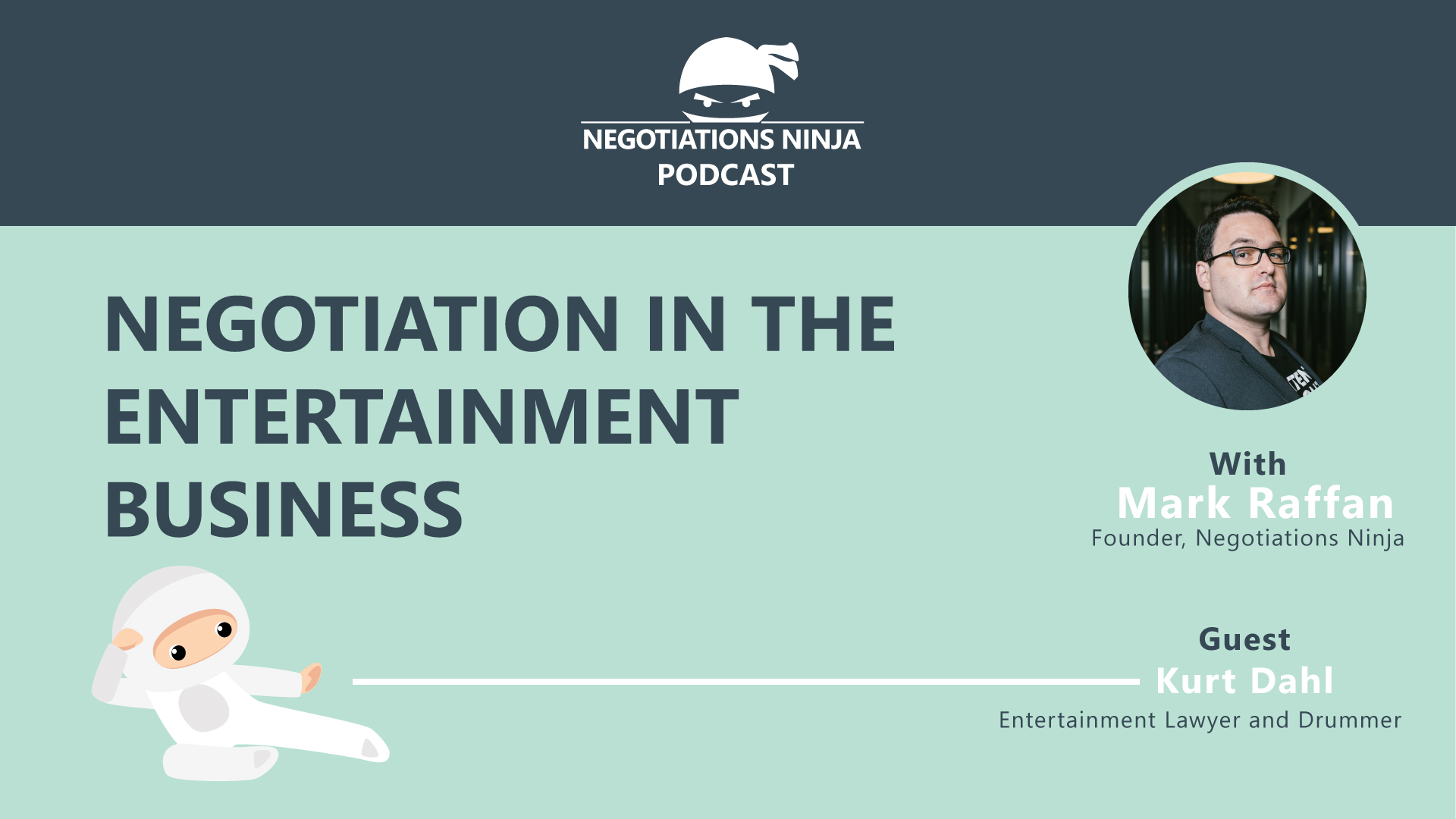Kurt is an entertainment lawyer and has been actively involved in the music industry for the past two decades.
His clients range from Juno-winning bands, record labels, publishers, and managers, to the smallest up-and-coming artists.
He tours the country regularly with his band “One Bad Son,” working with some of the biggest names in the music business, like Def Leppard and Judas Priest.
Kurt and I talk about negotiating in the entertainment business, what some of the misconceptions about the entertainment business are, and what business people can learn from negotiations in the entertainment business
Outline of This Episode
- [2:26] Learn more about Kurt Dahl and the entertainment industry
- [4:23] The false assumptions about the entertainment business
- [7:37] Where is the big money in the entertainment industry?
- [8:23] How changing technology impacts negotiation
- [10:38] How does an artist gain leverage in a negotiation?
- [16:28] What businesses can learn from artist negotiations
- [18:56] What happens when a negotiation goes well?
- [23:37] A negotiation that didn’t go well (and what Kurt learned)
How changing technology impacts negotiation in the entertainment business
In the old industry, record labels provided funding for artist development. Bruce Springsteen’s first two records didn’t sell well but on his third record, “Born to Run,” he broke through. Labels aren’t willing to incur that cost anymore. At first blush, that’s a negative.
It forces artists to develop themselves. Many spend years trying to make a name for themselves. But once they do break, they have more control over their careers. When Burce Springsteen became a household name, the label owned everything. He only got a percentage of record sales.
How does an artist gain leverage in the negotiation?
It’s all about knowing your strengths, weaknesses, and goals. Kurt negotiated a million-dollar deal for a client who had garnered some hype. They knew what they wanted and were prepared to walk away. They were fine to work with a smaller label if necessary.
Most labels want to turn artists into mainstream pop successes. But that might not be your thing. Maybe you’re supposed to play to a small but devoted group of fans. If you try to change what’s special to you to appeal to the masses, you’re doing yourself a major disservice.
Know what you want, be true to yourself, and find the label that works for you. If you’re willing to—and can—walk away, you’re giving yourself leverage.
What businesses can learn from artist negotiations
A lot of negotiations involve one party that’s “bigger” than the other. Both parties are rarely at the same level. The artist rarely has the power of the company signing them. The great thing about the entertainment world is that everyone comes from nothing. Media companies know that an artist can be the “next big thing” and lead to a multi-million-dollar enterprise.
But labels will often start with a boilerplate lowball offer. Because artists are typically broke and starving, they often take it. Kurt’s been approached after a lot of bad deals have been signed.
That’s why you need to approach a lawyer who knows what they’re doing to help you find wiggle room in the offer before you sign. He or she will let the other side know what they want or they’ll walk away. It shows that the artist has faith in themselves.
What happens when a negotiation goes well?
A good negotiation hinges on both parties setting realistic expectations. They need to realize each side’s strengths and weaknesses. Some artists might not sell records but they do sell concert tickets.
The Grateful Dead is one of the greatest concert draws of all time but they didn’t sell many records. They didn’t have a lot of hits. Pearl Jam had some early hits. But people love them because they said “no.”
It comes back to knowing yourself. What can you offer in the music world that no one else can? Mutual understanding and respect from both sides is key. When you have unrealistic expectations, negotiations don’t go well.
A negotiation that didn’t go well (and what Kurt learned)
Kurt negotiated a million-dollar deal for a client but only because negotiations failed with the first company. The artist was approached by a major producer who’s a household name (with an imprint label at the largest label in the world). But to produce the artist, they’d have to sign with his label.
The problem was that the major label offered major label terms. What Kurt’s artist really wanted was a relationship with a mid-size label with terms that were more fair to him. After 8 months of negotiations, Kurt realized that you can’t change the nature of the person you’re negotiating with. They couldn’t find common ground, so they walked away.
It was risky. But that famous producer came back and offered them a deal through his publishing company. They went with a smaller label for recording. It couldn’t have worked out better.
Connect with Kurt Dahl
- Kurt’s website
- One Bad Son
Connect With Mark
- Follow Negotiations Ninja on Twitter: @NegotiationPod
- Connect with Mark on LinkedIn
- Follow Negotiations Ninja on LinkedIn
- Connect on Instagram: @NegotiationPod




